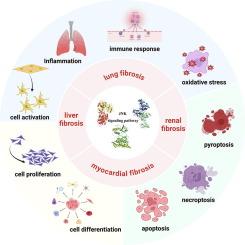The role of JNK signaling pathway in organ fibrosis
IF 11.4
1区 综合性期刊
Q1 MULTIDISCIPLINARY SCIENCES
引用次数: 0
Abstract
Background
Fibrosis is a tissue damage repair response caused by multiple pathogenic factors which could occur in almost every apparatus and leading to the tissue structure damage, physiological abnormality, and even organ failure until death. Up to now, there is still no specific drugs or strategies can effectively block or changeover tissue fibrosis. JNKs, a subset of mitogen-activated protein kinases (MAPK), have been reported that participates in various biological processes, such as genetic expression, DNA damage, and cell activation/proliferation/death pathways. Increasing studies indicated that abnormal regulation of JNK signal pathway has strongly associated with tissue fibrosis.Aim of review
This review designed to sum up the molecular mechanism progresses in the role of JNK signal pathway in organ fibrosis, hoping to provide a novel therapy strategy to tackle tissue fibrosis.Key scientific concepts of review
Recent evidence shows that JNK signaling pathway could modulates inflammation, immunoreaction, oxidative stress and Multiple cell biological functions in organ fibrosis. Therefore, targeting the JNK pathway may be a useful strategy in cure fibrosis.

JNK 信号通路在器官纤维化中的作用
背景纤维化是由多种致病因素引起的一种组织损伤修复反应,几乎可发生于所有器械,导致组织结构损伤、生理异常,甚至器官衰竭直至死亡。迄今为止,仍没有特效药物或策略能有效阻断或改变组织纤维化。据报道,JNKs 是丝裂原活化蛋白激酶(MAPK)的一个子集,参与多种生物过程,如基因表达、DNA 损伤和细胞活化/增殖/死亡途径。越来越多的研究表明,JNK 信号通路的异常调控与组织纤维化密切相关。综述目的本综述旨在总结 JNK 信号通路在器官纤维化中作用的分子机制研究进展,希望为解决组织纤维化问题提供一种新的治疗策略。因此,靶向 JNK 通路可能是治疗纤维化的有效策略。
本文章由计算机程序翻译,如有差异,请以英文原文为准。
求助全文
约1分钟内获得全文
求助全文
来源期刊

Journal of Advanced Research
Multidisciplinary-Multidisciplinary
CiteScore
21.60
自引率
0.90%
发文量
280
审稿时长
12 weeks
期刊介绍:
Journal of Advanced Research (J. Adv. Res.) is an applied/natural sciences, peer-reviewed journal that focuses on interdisciplinary research. The journal aims to contribute to applied research and knowledge worldwide through the publication of original and high-quality research articles in the fields of Medicine, Pharmaceutical Sciences, Dentistry, Physical Therapy, Veterinary Medicine, and Basic and Biological Sciences.
The following abstracting and indexing services cover the Journal of Advanced Research: PubMed/Medline, Essential Science Indicators, Web of Science, Scopus, PubMed Central, PubMed, Science Citation Index Expanded, Directory of Open Access Journals (DOAJ), and INSPEC.
 求助内容:
求助内容: 应助结果提醒方式:
应助结果提醒方式:


